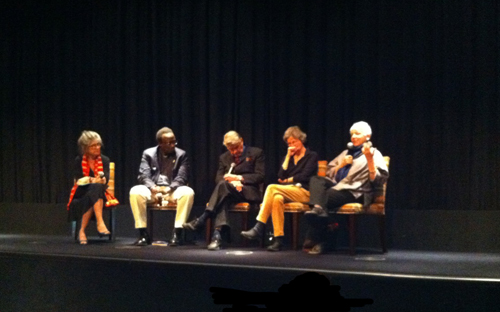
(Left to Right: Helen Whitney, Reverend Petero Sabune, Donald Shriver, Sensei Nancy Mujo Baker, Helen Tworkov)
Last night, to kick off the Awake in the World series of events that Tricycle will be hosting—we’ll tell you more about this as the year goes on—we held an advance screening of segments from the upcoming PBS special Forgiveness: A Time to Love and a Time to Hate. In Forgiveness, filmmaker Helen Whitney plunges into the depths of what it means to forgive, for both individuals and as communities. Last night we watched sections that looked at the Amish families of the 2006 shooting of school children in Nickel Mines, Pennsylvania, and the struggle of a 60s radical seeking forgiveness for the murder of a police officer she was involved in during a violent act of protest against the Vietnam War. The grieving process of the police officer’s daughter was also explored.
After the screening there was a panel discussion with filmmaker Helen Whitney, Reverend Petero Sabune, the chaplain at Sing Sing Prison, Don Shriver, the former president of Union Theological Seminary, Sensei Nancy Mujo Baker, Tricycle contributor and professor at Sarah Lawrence College, and Helen Tworkov, founder of Tricycle.
During the discussion there were more questions raised than answers provided, but, to my mind, the most interesting topic explored was what forgiveness might look like from a Buddhist perspective. Tworkov remarked that forgiveness in a Christian context often has to do with the other—seeking forgiveness from the person that has been wronged. However, a Buddhist perspective on forgiveness might have something more to do with looking inward. Doing inner work to deal with the feelings that arise either when you are wronged or have done wrong.
What do you think a Buddhist approach to forgiveness might look like?